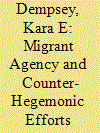| Srl | Item |
| 1 |
ID:
184321


|
|
|
|
|
| Summary/Abstract |
Much of Northern Ireland remains divided as it continues to transition from a prolonged ethno-national struggle during a period of violence known as “the Troubles” (1969–1998). This conflict resulted in the loss of thousands of lives, residential segregation and the construction of “peace walls” that separate the two ethno-national communities (i.e. “Catholic”/republican and “Protestant”/loyalist) in parts of many of its cities and towns. Residential segregation and violent national projects in cities such as Belfast not only reflect wider regional national tensions; they often are the foundation from which the ethno-national conflicts first emerged and continue to persist and reinforce the non-inclusionary fissures between two communities. Exclusionary national ideologies, narratives and practices, manifested through parading, sectarian political murals and residential segregation demonstrate how many embody a restrictive vision of national identity. However, there are a few notable exceptions to these discriminatory practices – one of which is the subject of this paper. 174 Trust is a community centre in the divided northwest side of Belfast that is designed and dedicated to providing an inclusive, safe and “shared” place to foster a new form of civic nationalism. Through an analysis of their contemporary efforts to transform exclusionary historical expressions of nationalism by fostering a shared civic nationalism, this paper interrogates nationalism by focusing on a significant grassroots effort that may be overlooked in general investigations. As I suggest, the lessons offered by this community centre exemplify the potential of a micro-political approach and serve as a powerful model for future development within this and other divided communities.
|
|
|
|
|
|
|
|
|
|
|
|
|
|
|
|
| 2 |
ID:
184324


|
|
|
|
|
| Summary/Abstract |
Wars and conflicts around the world take the lives of millions and leave millions more displaced both physically and emotionally. With an unprecedented number of displaced peoples worldwide, the plight of refugees, stateless, and internally-displaced people remains a crucial global issue. The current COVID-19 pandemic and subsequent growth of restrictions and barriers to mobility and resettlement have further exacerbated the challenges faced by displaced persons.
|
|
|
|
|
|
|
|
|
|
|
|
|
|
|
|
| 3 |
ID:
184326


|
|
|
|
|
| Summary/Abstract |
Migrants who reach EU asylum camps face various forms of spatialised violence that are bolstered by or produced within these geopolitical protracted spaces of waiting. Segregated from society, migrants experience processes of displacement, alienation and vulnerability as their legal status restricts their mobility and postpones employment or education opportunities. They are simultaneously suspended in a state of continuous disruption as they move through a series of camps while waiting for a decision on their applications. In remonstration, some migrants develop advocacy networks within and across camps in an attempt to challenge the hierarchical control of the everyday spaces and politics that migrants encounter in camps. Drawing on original fieldwork, this paper interrogates the intersection of the spatial production of geopolitical violence in camps and migrant agency within these distinctive political spaces. I argue that a state-centred examination of spaces of violence and migrant agency fails to attend to embodied and emotional landscapes when problematising the geographies of camps and those waiting in interim zones of confinement. In contrast, this examination of the embodied migrant experiences and advocacy networks brings the geopolitics of human and affective matter to the forefront. In this way, the article highlights migrant agency in response to their lived experience and the embodied geopolitical violence of control, categorisation and exclusion that is produced in the various spatialities of asylum seeking.
|
|
|
|
|
|
|
|
|
|
|
|
|
|
|
|